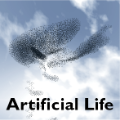This research project investigates Lenia, an artificial life platform that simulates ecosystems of digital creatures. Lenia's ecosystem consists of simple, artificial organisms that can move, consume, grow, and reproduce. The platform is important as a tool for studying artificial life and evolution, as it provides a scalable and flexible environment for creating a diverse range of organisms with varying abilities and behaviors. Measuring complexity in Lenia is a key aspect of the study, which identifies the metrics for measuring long-term complex emerging behavior of rules, with the aim of evolving better Lenia behaviors which are yet not discovered. The Genetic Algorithm uses neighborhoods or kernels as genotype while keeping the rest of the parameters of Lenia as fixed, for example growth function, to produce different behaviors respective to the population and then measures fitness value to decide the complexity of the resulting behavior. First, we use Variation over Time as a fitness function where higher variance between the frames are rewarded. Second, we use Auto-encoder based fitness where variation of the list of reconstruction loss for the frames is rewarded. Third, we perform combined fitness where higher variation of the pixel density of reconstructed frames is rewarded. All three experiments are tweaked with pixel alive threshold and frames used. Finally, after performing nine experiments of each fitness for 500 generations, we pick configurations from all experiments such that there is a scope of further evolution, and run it for 2500 generations. Results show that the kernel's center of mass increases with a specific set of pixels and together with borders the kernel try to achieve a Gaussian distribution. Results are available at https://s4nyam.github.io/evolenia/
翻译:暂无翻译


